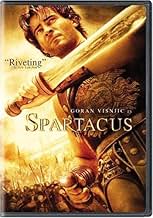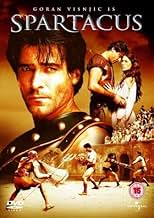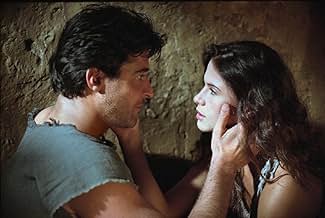AVALIAÇÃO DA IMDb
6,6/10
5,9 mil
SUA AVALIAÇÃO
Em uma Roma repleta de intrigas políticas, guerras civis entre aristocratas e provincianos, e lutas de arena, a expansão do Império é vital.Em uma Roma repleta de intrigas políticas, guerras civis entre aristocratas e provincianos, e lutas de arena, a expansão do Império é vital.Em uma Roma repleta de intrigas políticas, guerras civis entre aristocratas e provincianos, e lutas de arena, a expansão do Império é vital.
- Indicado para 1 Primetime Emmy
- 1 vitória e 7 indicações no total
Explorar episódios
Avaliações em destaque
One of the previous reviewers, whose review garnered a "useful" label by 29 out of 29 people at the time of this writing, had the gall to correct the "thumbs up" vs "thumbs down" decision-making style of the gladiatorial arena.
This is the height of hubris. In reality, there is not a person alive today who truly knows what motion of the hand meant what in ancient Rome. The entirety of our knowledge of the "thumbs up" thing comes from a passage in a letter written in Latin where it is mentioned that at a recent gladiatorial game the writer had observed that the fate was decided in "the usual way" by means of "pressed thumb". Hollywood interpreted this as thumbs up vs thumbs down, but who the hell knows what it really means.
Where the previous author collected this notion of down meaning "spare him" and some kind of "stabbing motion" meaning "kill him" is completely mysterious and untrue. The arrogance with which he delivered the assuredly true claim forced me to correct him publicly, as his review of this film had been validated by 29 people, which by extension validated this fiction he perpetrates.
This is the height of hubris. In reality, there is not a person alive today who truly knows what motion of the hand meant what in ancient Rome. The entirety of our knowledge of the "thumbs up" thing comes from a passage in a letter written in Latin where it is mentioned that at a recent gladiatorial game the writer had observed that the fate was decided in "the usual way" by means of "pressed thumb". Hollywood interpreted this as thumbs up vs thumbs down, but who the hell knows what it really means.
Where the previous author collected this notion of down meaning "spare him" and some kind of "stabbing motion" meaning "kill him" is completely mysterious and untrue. The arrogance with which he delivered the assuredly true claim forced me to correct him publicly, as his review of this film had been validated by 29 people, which by extension validated this fiction he perpetrates.
The original Spartacus is a superior movie as movies go. However, this version has much to offer and won't disappoint. The depiction of the Gladiator fights has several authentic touches such as the branding on the neck of the losing fighter. The brand was to insure the gladiator wasn't faking death! They still got the thumbs-down crowd signal wrong. In the movies, the thumbs-down means the crowd wants the loser to die. In reality the thumbs-down meant to let the loser live and to signal the victor to put down their sword. The death signal was a thumb stabbing motion toward the heart. I suppose they can be forgiven because few people watching the movie would know that and it would probably confuse most people to change it. They likewise included the signal of the losing fighter to plead for mercy, but got that wrong slightly too because the signal is one finger, not two. Still, they obviously tried to get things more accurate. The gladiator characters were quite accurate as were their weaponry and armor. Very good job there. They obviously paid attention to the discoveries made since "Gladiator" came out in 2000.
But the gladitorial combat scenes are a very small part of this movie. This is primarily a war movie and the war is a fight for freedom by slaves against the Roman empire. The producers retained much of the social commentary from Howard Fast's book. It fact they hit you over the head with it in case you didn't read the book. Most important in this the Draba character, the black gladiator who fights Spartacus. His role, though small, is key to the story. Also pay attention to Agrippa, the Roman Senator who is constantly making Crassius' life miserable. He's not what he seems, so pay attention.
Watching the mini-series on USA Network over two separate nights days apart is unbearable. But when commercials are edited out and you can watch the whole thing without so many interruptions, the narrative is quite fluid. This would make a nice DVD because the photography is good, the costumes detailed, the acting/casting good, and the story excellent.
It is just not the same movie as the 1960 version. Don't expect a simple remake. The ending is different. Spartacus' fate is different. It's more like Howard Fast wrote it originally than what Hollywood made of it in 1960.
The 1960 version is superb, but it's not the same as this movie. It's a similar but different story. I highly recommend this version along with the original.
But the gladitorial combat scenes are a very small part of this movie. This is primarily a war movie and the war is a fight for freedom by slaves against the Roman empire. The producers retained much of the social commentary from Howard Fast's book. It fact they hit you over the head with it in case you didn't read the book. Most important in this the Draba character, the black gladiator who fights Spartacus. His role, though small, is key to the story. Also pay attention to Agrippa, the Roman Senator who is constantly making Crassius' life miserable. He's not what he seems, so pay attention.
Watching the mini-series on USA Network over two separate nights days apart is unbearable. But when commercials are edited out and you can watch the whole thing without so many interruptions, the narrative is quite fluid. This would make a nice DVD because the photography is good, the costumes detailed, the acting/casting good, and the story excellent.
It is just not the same movie as the 1960 version. Don't expect a simple remake. The ending is different. Spartacus' fate is different. It's more like Howard Fast wrote it originally than what Hollywood made of it in 1960.
The 1960 version is superb, but it's not the same as this movie. It's a similar but different story. I highly recommend this version along with the original.
There's some confusion about this Spartacus miniseries and the 1960 epic movie Spartacus. The stories are very similar because they both use the Howard Fast novel as a basis. The Kirk Douglas movie had another mission though as it was one of a group of movies made to regain the public's interest in the cinema with lavish spectacle. The scale of its production is much higher than the miniseries. What the miniseries has going for it is more historical accuracy; the gladiator/rebel army marched up Italy, got to the Alps and changed its mind (very puzzling), marched down to Italy's toe hoping to escape by boat but was foiled and was trapped for a time. They broke out only to quarrel amongst themselves and break up into at least two groups. This proved their undoing as the Romans first massacred the smaller group of Gauls and then defeated Spartacus in turn. Spartacus' body was never identified, but many were crucified along the road all the way to Rome. Spartacus and his army made the Romans pay in much blood and defeat leading up to his and their ultimate defeat, though, requiring 15 or 16 legions to chase them down. Spartacus is a favorite hero of the Communists, BTW, being the working stiff rising up against the ruling class, etc...
The 1960 epic is short on accuracy, instead showing the rebel army defeating the garrison of Rome and another legion or 3 along the way to Brundusium, only to turn back and get overwhelmed by multiple Roman armies. It was a closer match to the actual scale of events, as the rebels numbered around 90-100,000. But they both have the same love story tacked on along with treachery in the Roman Senate by ahistorical Roman Senators, and a Crassus obsessed with possessing the strength of Spartacus by possesing his woman.
The 1960 remains my favorite version simply because its a well-done big movie (I wouldn't want to be the one to reprise Olivier's Crassus!)although it was good to see a more accurate portrayal of the course of events shown in the miniseries. The acting was pretty good, with Spartacus' Visnjic a good choice for the title role.
The 1960 epic is short on accuracy, instead showing the rebel army defeating the garrison of Rome and another legion or 3 along the way to Brundusium, only to turn back and get overwhelmed by multiple Roman armies. It was a closer match to the actual scale of events, as the rebels numbered around 90-100,000. But they both have the same love story tacked on along with treachery in the Roman Senate by ahistorical Roman Senators, and a Crassus obsessed with possessing the strength of Spartacus by possesing his woman.
The 1960 remains my favorite version simply because its a well-done big movie (I wouldn't want to be the one to reprise Olivier's Crassus!)although it was good to see a more accurate portrayal of the course of events shown in the miniseries. The acting was pretty good, with Spartacus' Visnjic a good choice for the title role.
Goran Visnjic gave a very credible performance as Spartacus. Instead of the superhero-style portrayed by Kirk Douglas (which I happened to LOVE that movie), Goran added more depth to the character ... the strengths AND the weaknesses. I also liked how the show developed his skills as a gladiator by having him do some real fighting rather than how it was done in the original.
Crassus (played by Angus MacFadyen) was likewise very three-dimensional. It was a shame that the movie was only 2 hours long (4 hours if you count the commercials). Given more time, it would have been enjoyable to see more of Crassus's political maneuvering. If that character had been born in our century, he'd be king of our country by now.
And there were surprisingly strong performances by others in bit-parts, like George Calil as Pompey, Ben Cross as Glabrus, and Henry Simmons as Draba. You can see that they did their homework and put real work into their character developments.
All in all, I give it an '8'. I'd like to give it a higher score, but I thought that the fight scenes were less than spectacular. Add a few thousand more stand-ins and maybe it would have been more believable. But I just didn't get the sense of volume that should have been there.
Crassus (played by Angus MacFadyen) was likewise very three-dimensional. It was a shame that the movie was only 2 hours long (4 hours if you count the commercials). Given more time, it would have been enjoyable to see more of Crassus's political maneuvering. If that character had been born in our century, he'd be king of our country by now.
And there were surprisingly strong performances by others in bit-parts, like George Calil as Pompey, Ben Cross as Glabrus, and Henry Simmons as Draba. You can see that they did their homework and put real work into their character developments.
All in all, I give it an '8'. I'd like to give it a higher score, but I thought that the fight scenes were less than spectacular. Add a few thousand more stand-ins and maybe it would have been more believable. But I just didn't get the sense of volume that should have been there.
This was beautifully acted and when it was over I wanted more! However when the ending credits started to roll I was disgusted to see that Goran Visnijic's name was spelled Goren. Okay if you misspell Visnijic that's one thing but how hard is Goran? That seems awfully disrespectful and unprofessional. Where are the editors? There was a reminiscence of Braveheart especially since "Robert the Bruce" was opposite Goran for the spotlight here. And who could've missed the famous battle cry of "FREEDOM" when it was shouted? I loved Braveheart, I loved Spartacus and, what can I say I love Goran Visnijic. I think it's important these days to try and adequately and accurately portrait history's important events using television and movies because our children almost depend on it as a source of information. Using special effects and quality actors is a good start, thumbs up, but please fix your misspelling.
Você sabia?
- CuriosidadesA noticeable piece of dramatic license has Spartacus' son born exactly at the moment Spartacus dies in battle. As Marcus Crassus and Pompey Magnus are proclaimed co-consuls, the announcer calls Rome an empire, when it was still a republic at the time.
- Erros de gravaçãoWhen Spartacus is about to cut Crixus's throat, the fillings in Crixus's mouth are visible.
Principais escolhas
Faça login para avaliar e ver a lista de recomendações personalizadas
- How many seasons does Spartacus have?Fornecido pela Alexa
Detalhes
- Tempo de duração1 hora 27 minutos
- Cor
- Proporção
- 1.78 : 1
Contribua para esta página
Sugerir uma alteração ou adicionar conteúdo ausente

























